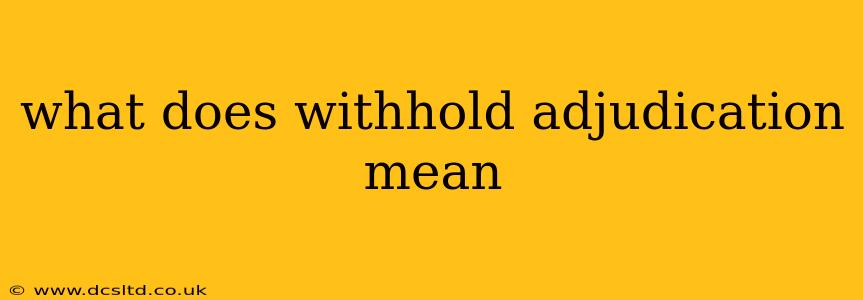Withhold adjudication is a legal term signifying a delay or postponement of a final court decision or judgment. It's a process where the court temporarily suspends the formal adjudication (or judgment) of a case, usually under specific conditions and for a defined period. This doesn't mean the case is dismissed; rather, it's placed on hold, pending the fulfillment of certain requirements or the occurrence of particular events. Think of it as a conditional pause in the legal process.
The exact implications of withholding adjudication vary depending on the jurisdiction and the specific circumstances of the case. However, it commonly involves a defendant agreeing to meet certain conditions—often involving rehabilitation, community service, or restitution—in exchange for the postponement of a formal judgment. If the defendant successfully completes these conditions, the charges may be dismissed, or the sentence might be significantly reduced or avoided altogether. Failure to meet the conditions usually results in the court proceeding with the original adjudication.
Why Would a Court Withhold Adjudication?
Courts often opt for withholding adjudication to achieve several goals:
-
Promote Rehabilitation: For less serious offenses, especially first-time offenders, withholding adjudication offers a chance for rehabilitation without the permanent stigma of a criminal conviction. This allows individuals to address the underlying issues contributing to their offense, reducing the likelihood of future criminal activity.
-
Avoid Unnecessary Harsh Penalties: In situations where a formal conviction would have disproportionately severe consequences, such as impacting employment opportunities or immigration status, withholding adjudication can provide a more lenient outcome.
-
Encourages Compliance: The conditions imposed during the withholding period incentivize compliance and positive behavioral change. Successful completion demonstrates a commitment to reform.
-
Manage Court Resources: In some cases, withholding adjudication may be used to manage court resources efficiently, particularly when dealing with a large volume of less serious cases.
What Happens During a Period of Withheld Adjudication?
During the withholding period, the defendant is typically required to adhere to specific conditions set by the court. These might include:
- Community Service: Performing a set number of hours of unpaid work benefiting the community.
- Restitution: Repaying victims for any financial losses incurred due to the crime.
- Drug or Alcohol Treatment: Completing a rehabilitation program.
- Mental Health Counseling: Seeking professional help for mental health issues.
- Avoiding Certain Places or People: Staying away from specific locations or individuals to minimize the risk of further offenses.
- Maintaining Employment: Demonstrating a commitment to stable employment.
What Happens if Conditions Are Met vs. Not Met?
-
Conditions Met: If the defendant successfully completes all the stipulated conditions within the specified timeframe, the charges are often dismissed, and the adjudication is withheld permanently. There's no criminal record associated with the case. This essentially results in a clean slate.
-
Conditions Not Met: Failure to comply with the conditions typically results in the court proceeding with the original adjudication. This means a formal judgment is entered, leading to a criminal record and potentially the imposition of the initially considered sentence.
How Does Withholding Adjudication Differ From Other Legal Outcomes?
It's crucial to distinguish withholding adjudication from other legal outcomes:
-
Dismissal: A dismissal means the charges are dropped entirely, and the case is closed. Withholding adjudication involves a temporary pause, with the potential for later dismissal contingent upon meeting conditions.
-
Deferred Adjudication: Similar to withholding adjudication, deferred adjudication involves a delay in judgment, but it often involves a longer period and may have stricter reporting requirements. The terminology and specific implications vary by jurisdiction.
-
Plea Bargain: A plea bargain is a negotiated agreement between the prosecution and the defendant, where the defendant pleads guilty to a lesser charge in exchange for a reduced sentence. Withholding adjudication is a decision made by the judge, not necessarily a negotiated outcome.
Is Withholding Adjudication Right for Everyone?
Withholding adjudication isn't suitable for all cases. The severity of the offense, the defendant's criminal history, and the potential risks to public safety are all factors considered by the court. It's primarily reserved for less serious offenses and individuals who demonstrate a genuine willingness to reform their behavior.
This information is for general understanding only and does not constitute legal advice. If you have specific legal questions regarding withholding adjudication, it is essential to consult with a qualified legal professional in your jurisdiction.
